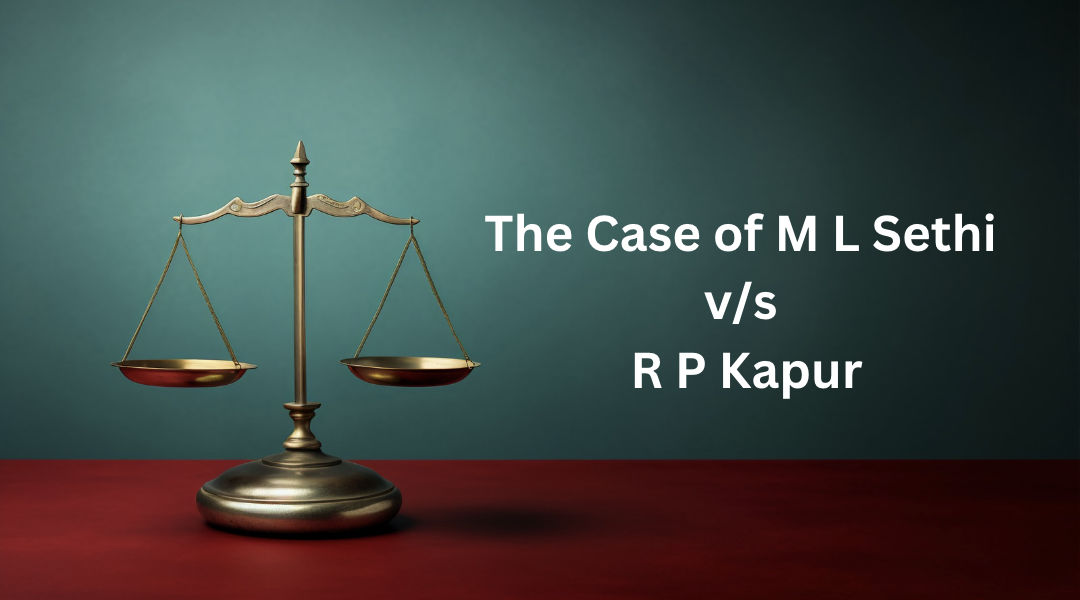
According to section 173 of criminal procedure code, the Magistrate cannot act in any capacity as a judge or as a court until he receives the police officer’s final report. Furthermore, as per the ruling in ml sethi vs rp kapur, the magistrate has no jurisdiction to issue any judicial orders regarding the police inquiry.
ml sethi vs rp kapur Case Facts
- The respondent sued the appellant and his wife in forma pauperis on April 29, 1962, claiming damages for malicious prosecution totaling Rs. 7,48,000/-.
- The State Government and the appellant were notified of the petition to sue in forma pauperis in accordance with Order 33, rule 6 of the civil procedure code.
- The appellant and the Government both took issue with the respondent’s pauper status. In order to prove that the respondent is not impoverished, the appellant then filed a move for the discovery of papers from the respondent.
- The Court issued an order on February 23, 1970, directing the respondent to produce on affidavit all documents pertaining to the respondent’s properties and personal accounts, as well as documents pertaining to the respondent’s bank accounts, which includes passbooks, cheque books, counterfoils, and various other items, from March 1, 1963, to the day of filing the affidavit of discovery.
- The respondent should have filed the affidavit in compliance with the requirement.
- He applied to the High Court on March 31, 1970, stating that he wanted to file a revision against the order dated February 23, 1970, and that he should be given two months to do so. The application for authority to suit in forma pauperis had been pending for seven years, and the respondent, if diligent, had ample time to file the revision, the Court refused the motion for extension of time on April 4, 1970.
- The respondent’s attorney filed a second motion that same day, stating that the respondent wanted to provide evidence and that the case may be postponed as he hadn’t shown in court because he thought his previous request for a postponement, dated March 31, 1970, would be accepted.
- This application was denied by the Court as well. Because the respondent’s attorney failed to submit any instructions and there was no evidence proving the respondent was impoverished, the court denied the request for authorization to use in forma pauperis and directed the respondent to pay the court cost within 15 days.
- The respondent challenged the orders for document discovery on February 23, 1970, and on April 4, 1970, the High Court denied his request for permission to file a lawsuit in forma pauperis.
ml sethi vs rp kapur Issues
- Is it illegal for the trial court to have ordered the documents to be discovered?
- And was it appropriate for the High Court to get involved in it?
ml sethi vs rp kapur: Provisions Involved
- Section 420 of IPC is illegal to cheat, dishonestly induce the delivery of property, or to make, change, or destroy a valuable security.
- Section 109 of IPC involves Penalties for Abetment
- Section 114 of IPC involves Abettor punishment, even if they were not present when the offense was committed
- Parties to criminal conspiracies are subject to punishment under Section 120B of IPC.
- As per Section 204 of IPC it is illegal to destroy a document or electronic record in order to keep it from being used as evidence.
- As per Section 211of IPC it is illegal to falsely accuse someone of committing an offense.
- As per Section 385 of IPC it is illegal to extort someone by making them fearful of you.
- Section 195 of IPC involves contempt of lawful authority of public personnel; prosecution for offenses against public justice, offenses involving materials admitted into evidence
- Section 253 of IPC involves conviction based on guilty plea while accused is not present
Contentions by the Parties
Petitioner:
- The appellant, M.L. Sethi, filed an appeal under a certificate granted by the High Court of Allahabad after the Magistrate refused two of his motions for the dismissal of a charge alleging that he had violated sections 211, 204, and 385 of the I.P.C.
- He argued that the provisions of section 195(1) of the Criminal Procedure Code prevented the offence from being called into cognizance under section 211 of the I.P.C.
- In addition, he filed a request asking for an injunction to stop the ongoing Magistrate court proceedings. On behalf of the appellant, Mr. Frank Anthony argued that sections 195(1)(B) of the Criminal Procedure Code. applied even in situations where there may not be any ongoing legal processes or cases that have previously been resolved.
Respondent:
- The State argued that when the complaint against the appellant was filed for offenses under sections 211, 204, and 385 of the Indian Penal Code and sections 195 of the Criminal Procedure Code, there were no ongoing proceedings in any court. Furthermore, S. 195(1)(B) of the Criminal Procedure Code did not apply.
ml sethi vs rp kapur: Important Observations
- By citing the well-known UK case Anisminic Ltd. v. Foreign Compensation Commission, the court, in this case, recognized the broader definition of jurisdiction and declared that “the practical effect of the decision in Anisminic case is the fact that any error of law can be reckoned as jurisdictional.”
- The court further noted that the consequence is almost the same as asserting that, in the event that a decision is legally correct, jurisdiction exists; in the event that a decision is incorrect, jurisdiction does not exist.
- The distinction between jurisdictional error as well as error of law was nearly eliminated following the UK decision. Previously, error of law was not thought to be the same as an error in the exercise of jurisdiction.
- The court’s opinion would be the sole factor in determining the extent of a legal error that would qualify as a jurisdictional error in this particular case.
- The only way to assess if there is excess jurisdiction or just a mistake within the jurisdiction is to interpret the authorizing act, which will not provide much help.
ml sethi vs rp kapur: Ratio Decidendi
- According to the Majority view of judges, or Ratio Decidendi, the authority to penalize for contempt of court must be used extremely carefully, cautiously, and circumspectly. Although courts are obligated to penalize contempt, they need to do so only in situations where there has been a significant and serious disruption of the reasonable administration of justice.
- Courts have an obligation to make sure that contempt actions do not become an instrument of repression of dissent or criticism, nor do they lead to an unwarranted restriction of the right to free speech and expression (Article 19 of the Indian Constitution).
ml sethi vs rp kapur Judgment
- The trial court, which had jurisdiction, issued the order for discovery. We do not think any error of law vitiated the order, even if every material error of law, including an error of law within the jurisdiction in the basic sense of the term, is considered to result in lack of jurisdiction.
- It is difficult to characterize, even in the broadest sense, the denial of the time request and, consequently, the dismissal of the petition for authorization to litigate in forma pauperis as a jurisdictional error, as previously explained. Nor are we persuaded that the order is defective since there was no natural justice breached in the refusal to adjourn.
- Furthermore, there is no proof that the Court used its jurisdiction in an inappropriate or seriously irregular manner when it denied the application for a longer time.
- Therefore, we would reverse the decision made by the High Court, allow the appeal, and in this case, not impose a costs order. The legitimacy of the August 26, 1971, High Court order compelling the respondent to strike the appellant’s wife’s name from the list of parties is unaffected by this decision.
Overall, this case law demonstrated the importance of having a just and equitable criminal justice system that protects the rights of both the accused and the victim of crime, especially where there is a chance that they would be the target of prejudice. In order to guarantee that justice is done, it stressed the significance of conducting a thorough investigation, having a fair trial, and respecting the presumptions of innocent. It also centered its attention on the necessity for the police to carry out an exhaustive investigation and gather all pertinent information in order to guarantee that the guilty are held accountable and the innocent are spared.
With the goal of giving students the best coaching available for law entrance exams including the CLAT, AILET, and various other numerous state judiciary exams, Jyoti Judiciary Coaching, India’s Finest educational Platform, was established. Come enrol now with Jyoti Judiciary!
For any latest news, legal topics, judiciary exams notifications, patterns, etc watch Jyoti Judiciary’s YouTube channel for legal videos for any updates at https://youtube.com/@jyotijudiciarycoaching4852?si=2cwubh9d2A9urwJf








